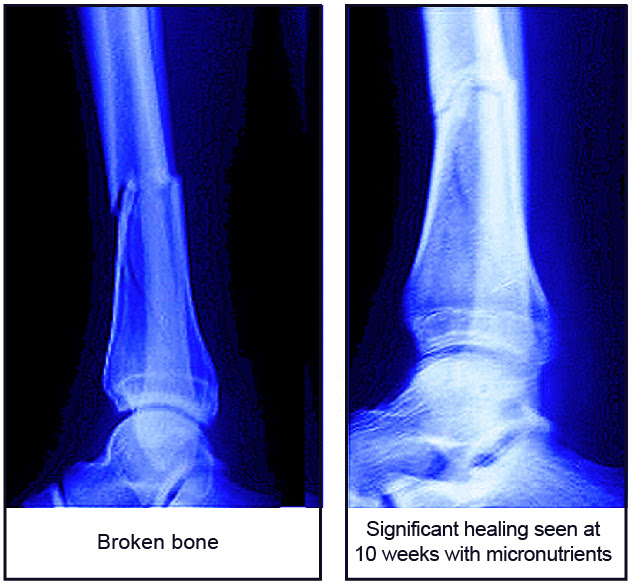
Some data on one of the many ingredients in my NutriBlast Greens Plus.

Tom's Blog on Life and Livingness

Some data on one of the many ingredients in my NutriBlast Greens Plus.

Ari Whitten writes:
Hey Tom,
My guest today, Dr. Wendie Trubow, went to France in 2019 for the trip of a lifetime.
But when she came home, her hair started falling out, she gained weight, and had a rash all over her face. She tested her thyroid (perfect), hormones (perfect), and gut (great).
Ultimately, she realized that when Notre Dame burned, it released 500 tons of lead into the air and soil, and she had slogged through that dust for a week. Testing showed that her lead levels were incredibly high.
Her biggest insight was that all the modern medical issues she treated as a functional MD—obesity, diabetes, cancer, insomnia, endocrine dysfunction, gut dysfunction—could be tracked back to toxic exposures, creating a state of inflammation.
Dr. Trubow believes your particular “soup” (genetics, lifestyle, early childhood, antibiotic use, diet, sleep, stress, relationships, self-talk, movement) determines how inflammation manifests in you.
Wendie’s story is really incredible, and I think you’ll love this podcast.
This episode was first released in Jan 2023
In this podcast, Dr. Trubow and I discuss:
How toxins are related to stubborn weight: they get stored in fatty tissue when you exceed your body’s ability to excrete them
Studies show that levels of persistent organic pollutants (“forever chemicals”) in the bloodstream during weight loss predict weight regain!
Alcohol is an acute toxin that takes priority in the liver—your body stops all other detox behavior (hormone processing, pesticide excretion) to focus exclusively on processing alcohol
By the time most women leave the house, they’ve put over 200 chemicals on their bodies, from shampoo, conditioner, face products, makeup, moisturizers, and perfumes
Your bed is a hidden toxin if it contains flame retardants—these are endocrine disruptors, mess up your thyroid and female hormones, and raise your risk of estrogen-dependent cancers
Never ask “What-if?” questions…ruminating about uncontrollable situations sends your body into fight-flight-freeze and shuts down detox
New cars contain over 300 chemicals, and even new clothes are sprayed with chemicals—wash clothes before you wear them, and shop consciously
Tom Renz writes:
The reason most of you know my name in the first place. COVID. The lockdowns. The hospital protocols. The vaccine mandates. The lies. That fight did not end. It just moved out of the headlines. The machinery is still there. The incentives are still there. And because nobody went to jail and trillions changed hands, you better believe there will be another so-called emergency.
On today’s show I brought on my friend Laura Bartlett, who has been on the front lines helping families navigate hospital abuse and the COVID murder protocols. During COVID, we watched hospitals override patient wishes, push deadly protocols, and ignore informed consent. Laura has been helping people fight back in real time.
Her focus is practical. If you walk into a hospital without preparation, you are stepping into a system designed to move fast, document little, and protect itself. We discuss how most people think they are getting informed consent, but in reality they are signing broad intake forms that can be twisted into blanket permission.
Laura laid out a proactive strategy. A structured “I do not consent” document process designed to create formal notice, documented delivery, and a clear paper trail. Not emotional arguments. Not yelling at nurses. Notice. Documentation. Evidence. The kind of structure that actually matters if you end up in court.
As an attorney, I can tell you this much. Notice is everything. Evidence is everything. If you want your no to mean no, you better be able to prove you said it clearly and that they received it. That is how you turn a debate into a liability problem for a hospital.
We also drew an important parallel. What happened in hospitals during COVID is not that different, legally speaking, from what we are seeing in certain child protective cases. When the state starts deciding it knows better than you about your body or your child, you have a systemic problem. And that problem does not fix itself.
On top of that, we talked about the insanity of pushing mRNA into flu shots. There is no long-term safety data. There is no legitimate emergency. And yet the machine keeps rolling. You cannot call yourself pro-health while green-lighting experimental technology without gold standard science. It does not work that way. Truth is truth, regardless of which administration is in power.
Support Laura’s work at: https://idonotconsentform.com/
(Tom: And while Tom Renz is US based, I do not think his advice at all irrelevant for us here in Australia.)

Despite decades of statin use costing approximately $25 billion annually in America alone, heart disease remains the leading cause of death, suggesting the cholesterol hypothesis that drives statin prescriptions is fundamentally flawed.
Studies show that lowering cholesterol with statins does not reduce heart disease, and yet these findings are ignored while statin guidelines are created by experts paid by pharmaceutical manufacturers.
Malcolm Kendrick’s clotting model provides a superior explanation for heart disease: atherosclerotic plaques result from repeated damage to blood vessel linings which the body repairs with layers of clots.
The medical establishment dismisses widespread reports of statin injuries as “nocebo effects,” paralleling how COVID-19 vaccine injuries were dismissed as “anxiety,” despite extensive evidence corroborating the injuries.
The actual causes of heart disease — fine particulate matter from pollution and cigarettes, lead exposure, chronic stress, and endothelial damage — receive minimal research funding because effective interventions cannot be patented and sold as expensive pharmaceuticals like statins.
Finish reading: https://articles.mercola.com/sites/articles/archive/2026/02/13/statin-cholesterol-heart-disease.aspx

(Tom: Some data on one of the dried fruits in my products.)
“Elderberry is known for its tart flavor, similar to a blackberry at peak ripeness. It’s fantastic in salads and an excellent pairing with figs. And, as one new study explains, it may also one day help people reverse insulin resistance.
In December, researchers from the Cleveland Clinic published their study’s findings in the journal Molecular Metabolism, explaining how the tiny elderberry may hold significant powers.
According to the researchers, the key player is cinnamic acid, a compound found in elderberry extract (and other fruits like tart cherries). In the study, mice were fed a high-fat diet with or without elderberry extract. When the animals that consumed the elderberry extract had a normal gut microbiome, a common gut bacterium, Clostridium sporogenes, converted cinnamic acid into a metabolite that helps break down food into energy and is transported from the intestines to the liver. Once there, the team said, it ‘activates pathways that improve insulin control and reduce fat creation.’”

In the spring of 1916, a doctor held a capsule in his hand. Inside was something unthinkable.
His wife stood beside him, holding one too.
They were about to swallow the disease killing thousands across America. On purpose.
For thirty years, a plague had swept through the American South. Records show pellagra killed over 100,000 Americans by 1914. The symptoms were horrifying. Skin turned to leather. Minds collapsed. Bodies wasted away.
Medical authorities declared pellagra an infectious disease that spread through contact. Towns quarantined neighborhoods. Families hid sick relatives in shame.
Dr. Joseph Goldberger had discovered something different.
He knew pellagra wasn’t caused by germs. But no one believed him.
To save millions, he’d have to do something unimaginable.
Goldberger arrived in the South in 1914, sent by the Surgeon General to solve the mystery. He walked into asylum wards expecting to find evidence of infection.
Instead, he found something every other doctor had missed.
The patients were dying. The nurses and doctors were perfectly fine.
In tuberculosis wards, staff caught tuberculosis. In typhoid hospitals, workers got typhoid. Germs didn’t care about your job title.
But here, medical workers moved untouched through rooms of dying patients. They bathed them. Changed their bedding. Spent twelve-hour shifts surrounded by supposed infection.
Not one got sick.
Goldberger watched what they ate. Staff meals included fresh meat, milk, vegetables, eggs. Patient meals were what Southerners called “The Three M’s”—fatback, cornmeal, molasses.
The same food every day. Month after month.
It wasn’t contagion killing these people. It was their diet.
Goldberger supplied “a diet such as that enjoyed by well-to-do people” to two Mississippi orphanages and an asylum. He added fresh meat, milk, and vegetables.
Within weeks, every pellagra case disappeared.
He published his findings triumphantly. The response shocked him.
Southern politicians, doctors, and newspapers erupted in fury. A Jewish immigrant from New York was telling the South their traditional diet was killing them. That workers weren’t paid enough to buy proper food. That pellagra wasn’t medical—it was economic.
They called him a fraud. A liar. An agitator.
Medical journals demanded he produce the infectious germ or retract his claims. Politicians refused federal food assistance, insisting the South would solve its own problems.
Curing children wasn’t enough proof.
Goldberger realized he had to create the disease from nothing.
In 1915, Goldberger approached Mississippi’s governor with an offer: pardons for twelve healthy inmates if they’d volunteer for a dietary experiment.
The prisoners agreed. They didn’t know what was coming.
For six months, Goldberger fed them only standard Southern working-class food. Grits, cornmeal, biscuits, syrup, white rice, coffee.
No meat. No milk. No fresh vegetables.
The transformation was horrifying.
Week by week, the men weakened. After six months, six of the eleven patients contracted pellagra. Their skin cracked and bled. The red rash appeared. Their minds grew foggy, then paranoid.
One prisoner begged to be released, saying he’d “been through a thousand hells” and would rather stay locked up forever than continue.
Goldberger had manufactured pellagra using only food.
He’d proven it wasn’t caused by germs.
The critics didn’t surrender. They insisted the prisoners must have had a hidden infection that the diet “triggered.” Still a germ, they claimed.
Goldberger had one final card to play.
In spring 1916, Goldberger hosted eight gatherings with seventeen total guests. He called them research parties, though others would later name them differently.
He gathered his most trusted colleagues. Doctors willing to risk everything.
And his wife, Mary.
They collected blood, urine, feces, mucus, throat secretions, and skin scabs from patients dying of pellagra.
They injected the blood directly into their veins.
They swabbed secretions deep into their noses and throats.
Finally, they mixed everything into flour paste. Rolled it into capsules.
And swallowed them.
Mary wrote years later that she had insisted on being included. When her husband wouldn’t let her swallow the capsules, she demanded to be injected with blood from a woman dying of pellagra instead.
One nurse assisting fled the room crying.
Then they waited.
Days crawled into weeks. Every headache was analyzed. Every skin irritation examined with terror.
If the critics were right, they would all die slowly. Painfully. Skin peeling off. Minds unraveling.
Mary would die because she’d trusted her husband.
The silence in their home was suffocating.
Nothing happened.
Six months after the experiments ended, in late 1916, none of the participants showed any signs of pellagra.
Not a single rash. Not one fever.
They’d consumed death itself and walked away healthy.
Because afterward, they’d eaten fresh meat, milk, and vegetables.
The experiments proved it beyond doubt. Pellagra wasn’t infectious.
You could swallow disease and survive—as long as you had proper nutrition.
Goldberger published everything. The orphanage recoveries. The prison experiments. The undeniable proof.
He expected policy changes. Food assistance programs. Better wages so workers could buy nutritious food.
Instead, the South buried the truth deeper.
Admitting pellagra came from malnutrition meant admitting sharecroppers weren’t paid living wages. It meant acknowledging the Southern economy exploited workers. It meant accepting federal intervention.
Politicians feared investors would flee if the South was labeled a poverty zone.
So thousands continued dying.
Goldberger spent the rest of his life searching for the specific missing nutrient. He lobbied. He published. He fought.
In 1929, exhausted, he died of kidney cancer at age 54.
He never saw pellagra’s cure widely distributed.
It wasn’t until 1942, when World War II forced the U.S. government to mandate flour fortification with niacin to keep soldiers healthy, that pellagra finally disappeared from America.
The missing nutrient was niacin—vitamin B3.
Goldberger had been nominated four times for the Nobel Prize. But he died before seeing his work validated.
He saved millions of lives. He just never got to see them live.
Think about what Joseph Goldberger did.
He didn’t just risk his career. He risked his life. He asked his wife to risk hers.
They consumed human waste from dying patients to prove a truth powerful people refused to accept.
Because admitting pellagra came from poverty meant admitting the economic system was broken. Meant acknowledging workers weren’t paid enough to eat. Meant facing an uncomfortable reality.
So they called him a liar. Buried his research. Let thousands keep dying rather than change the system.
Goldberger’s story isn’t just about scientific courage.
It’s about what happens when economic interests outweigh human lives.
The South knew the answer by 1916. They chose profit over people anyway.
Pellagra killed for another 25 years. Not because we didn’t know the cure. But because using it would require admitting why the disease existed in the first place.
For those who’ve watched truth get buried under politics, or seen problems ignored because solutions cost too much—which battles in your own life have felt the same way?

To those that still ask “where’s the evidence?“, I posted this one year ago:
Covid ’Vaccines’ Are ’Bioweapons’ That ’Cause Cancer’
Frank Bergman Slay News February 22, 2025
A world-renowned American doctor has issued a warning to the public that Covid mRNA “vaccines” are actually “bioweapons” that are causing deaths and deadly diseases to surge globally. Leading cardiologist Dr. Peter McCullough warns that the shots were intended to harm people by destroying their immune systems.
McCullough is warning of a ticking time bomb for those who received the “vaccines.”
However, McCullough’s remarks are not just a theory or prediction.
Since the injections were rolled out for public use in early 2021, sudden deaths and deadly diseases have skyrocketed.
Reports of people dying from heart attacks, strokes, blood clots, and turbo cancers have soared.
“I have never seen something so injurious to the human body,” McCullough said in a video statement.
“It invades the brain. It invades the heart.
“It causes brain and heart damage,” he added.
Spike proteins do untold damage to the human immune and reproductive system.
This fatal blow is designed to remove billions of humans from the planet to meet the goals of the globalist elite.
Not only will the mass deaths overwhelm hospitals, but the ripple effect will destroy the economy and thus cause social chaos.
Explaining how the “vaccines” harm the human body, McCullough continued:
“It invades the bone marrow.
“It stimulates antibodies to actually attack our own platelets and other cells in our body.
“It causes blood clotting and damage to blood vessels like we’ve never seen.
“Like we’ve never seen,” he reiterated.
“Data from the University of Pittsburgh suggests it causes cancer.
“Since when do we have a protein that actually injures the brain, injures the heart, the bone marrow, the immune system, causes blood clotting, and potentially causes cancer in a single protein?
“It’s a weapon,” McCullough said.
“According to strict military criteria, it’s a bioweapon.”
McCullough’s remarks echo those of renowned oncologist Dr. Angus Dalgleish.
Dr. Dalgleish has issued a bone-chilling warning about skyrocketing cases of deadly cancers among patients who received Covid mRNA “vaccines.”
As Slay News previously reported, Dalgleish is raising the alarm that mRNA “vaccines” are causing an increase in cancer relapses.
In addition, Dalgleish warns of a growing number of cases of “turbo cancers.”
Dalgleish argues that Covid mRNA “vaccines” are the cause of skyrocketing excess deaths recorded all around the world since early 2021.
He also asserts that the injections are linked to surges in cancer, which he described as “turbo cancers.”
The disease has been found to form and spread so rapidly among vaccinated people that doctors have dubbed the phenomenon “turbo cancer.”
Doctors have revealed that some “turbo cancers” spread so quickly that seemingly healthy patients can die within a week of being diagnosed.
Oncologists are also warning that these aggressive cancers don’t respond to conventional treatments.
This phenomenon has been seen globally.
“This is happening on a horrendous scale,” Dalgleish warns.
Meanwhile, a Pfizer scientist has just blown the whistle and warned the public that “crimes against humanity have been committed” during the development and global rollout of Covid mRNA “vaccines.”
According to Pfizer whistleblower Justin Leslie, the company’s Covid mRNA injections are “poison.”
As Slay New reported, Leslie shared a post from X boss Elon Musk and added his whistleblowing statement.
“Elon. I worked on this ’mRNA technology’ for @pfizer as a formulation analytical scientist,” Leslie asserted.
“You and @realDonaldTrump and @RobertKennedyJr need to pull the mRNA vaccines off the market immediately.
“Crimes against humanity have been committed and ignoring this is a notice of liability of injury and harm to the masses.
“Injecting this poison into innocent children is an attack on God and it must end.”
These warnings come as the U.S. Food and Drug Administration (FDA) has just made the explosive admission that Covid mRNA “vaccines” are spiked with contaminations that triggered a global surge in cancers.
The federal agency made the admission after an FDA study confirmed that Pfizer’s Covid mRNA “vaccine” contains dangerous levels of excess DNA contamination.
As Slay News previously reported, leading scientists have been warning for some time that surges in deadly cancers among the Covid-vaccinated were caused by DNA fragments in the mRNA injections.
Those warnings have now been confirmed in a bombshell study conducted in the FDA’s own laboratory.
Tests conducted at the FDA’s White Oak Campus in Maryland found shocking levels of DNA contamination in the “vaccines.”
The residual DNA levels exceeded regulatory safety limits by 6 to 470 times.
While six times the safe limit would be alarming, 470 times is unprecedented and nothing short of devastating.
“More young Australians – are being diagnosed with Cancers – once thought once only to affect older people”
“Cancer rates are increasing in young Australians:
“Ovarian Cancer up 30% – Breast Cancer up 50% & Bowell Cancer up 71% – other Cancers rates are increasing.”
It isn’t just Australia – its the entire Western world – now there’s detailed peer reviewed studies with huge sample numbers – proving the link between the Covid vaccines and cancer rates.
Of course Legacy Media will never ever tell you this – as they were also the ones that told you repeatedly to take the experimental jabs.
Watch video: https://x.com/BGatesIsaPyscho/status/2025852402939695407?s=20
Ever wonder why “normal” blood pressure keeps getting lower? Each drop expands the market — turning healthy people into lifelong customers.
~1940: 100 + your age (165/90 normal for a 65 yr old)
~1970: 160/90
~2000: 140/90
~2026: Must be under 120/80, or you’re “hypertensive”
The Profit Incentive…
• Global antihypertensive market: ~$27 billion in 2025
• Lower thresholds = millions more “diagnosed” = more scripts & revenue
• Most drugs only mask symptoms (stiff arteries, inflammation, stress) while creating side effects that often require…more drugs
Common Medication Side Effects…
• Chronic cough (ACE inhibitors)
• Electrolyte imbalances, low potassium/sodium (diuretics)
• Dizziness, fatigue, headaches
• Dehydration, muscle cramps, gout flares
• Insomnia, depression, vivid nightmares
• Slow/erratic heart rate, breathing issues
• Erectile dysfunction, libido loss
• Fainting spells, orthostatic hypotension
• Kidney strain, rare but serious angioedema
• In frail elderly: overly low BP linked to HIGHER mortality risk
Natural Ways to Optimize BP (Address Root Causes)…
• Eat whole, nutrient-dense foods — prioritize animal-based proteins, organs, eggs, dairy
• Eliminate seed oils, ultra-processed foods & excess sugar
• Boost potassium & magnesium (mineral-rich salt, leafy greens, avocados, supplement 4,700mg potassium & 600+mg magnesium glycinate if needed)
• Manage stress (breathwork, nature, sleep hygiene)
• Strength training + consistent movement
• Prioritize quality sleep & circadian rhythm
• Increase Nitric Oxide thru food & supplements.
Key nuance: In adults 80+, higher BP often correlates with better survival. Aggressive lowering can be harmful.
Question the ever-lowering numbers. Your health — not Pharma’s bottom line — should come first.
Video: https://x.com/ValerieAnne1970/status/2025616578470170990?s=20

Everyone is at risk of fracturing a bone from a fall, sport activities, or a car accident and it is all the more likely to happen to people suffering from osteoporosis. Bone fractures are one of the most painful injuries and require a lengthy recovery time.
The most common bone fracture, especially in active adults and children, is a broken leg, and often involves a tibial (or shinbone) fracture. In the US, approximately 492,000 tibial fractures are reported every year resulting in close to 400,000 hospital days. The usual time for healing a tibial fracture is 12 to 16 weeks. However, this is often delayed due to a high incidence of complications requiring strong painkillers for the patient. In European countries, osteoporosis related hip fractures were reported to be 620,000 according to a 2010 report.
A common perception is that vitamin D and calcium are the only nutrients needed for healthy bones or that they aid in the fracture healing process. However, this overlooks the fact that the framework of the bone on which calcium and other minerals are deposited is made of protein – collagen. Without healthy collagen, bone cannot form and function properly. Healthy bone formation depends not only on sufficient amounts of calcium and vitamin D, but more importantly on a proper supply of vitamin C, the amino acids lysine and proline, and other collagen supporting micronutrients. Since the human body cannot produce vitamin C and lysine internally, the deficiency of these critical nutrients is very likely and can be further depleted by stress associated with a bone fracture.
In a randomized double blind placebo-controlled clinical trial* involving 131 patients with tibial shaft fracture, we evaluated the effect of supplementation with collagen building micronutrients on the fracture healing time. The ages of study participants ranged from 15 to 75. We observed that the group of patients taking essential micronutrients containing vitamin C, lysine, proline, and vitamin B6 experienced faster fracture healing. Their fractures healed in 14 weeks, while it took 3 weeks longer for the patients taking the placebo (sugar pill) to experience similar healing. In addition, in about 25% of the patients in the supplemented group the bone fractures healed in as early as 10 weeks, while this was noted in only 14% of the patients in the control group. The patients in the supplemented group also reported improvements in a general feeling of well-being.
This study shows that a frequently missing factor in bone health – healthy collagen – plays an important role in optimum healing of bone fractures. A simple supplementation with specific micronutrients could greatly reduce healing time and patient suffering as well as lessen the economic burden on patient families and the healthcare system.